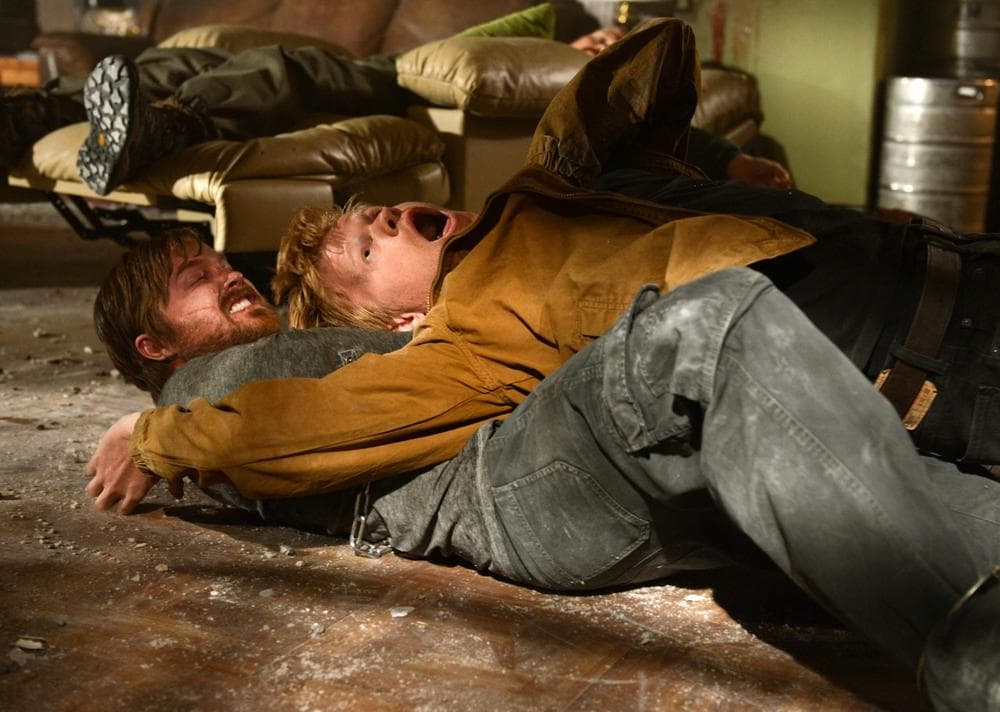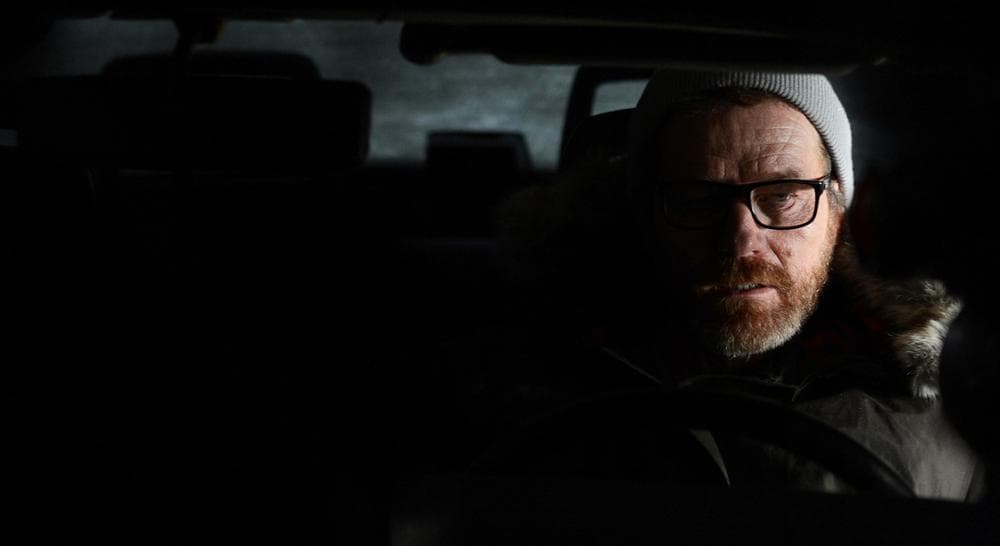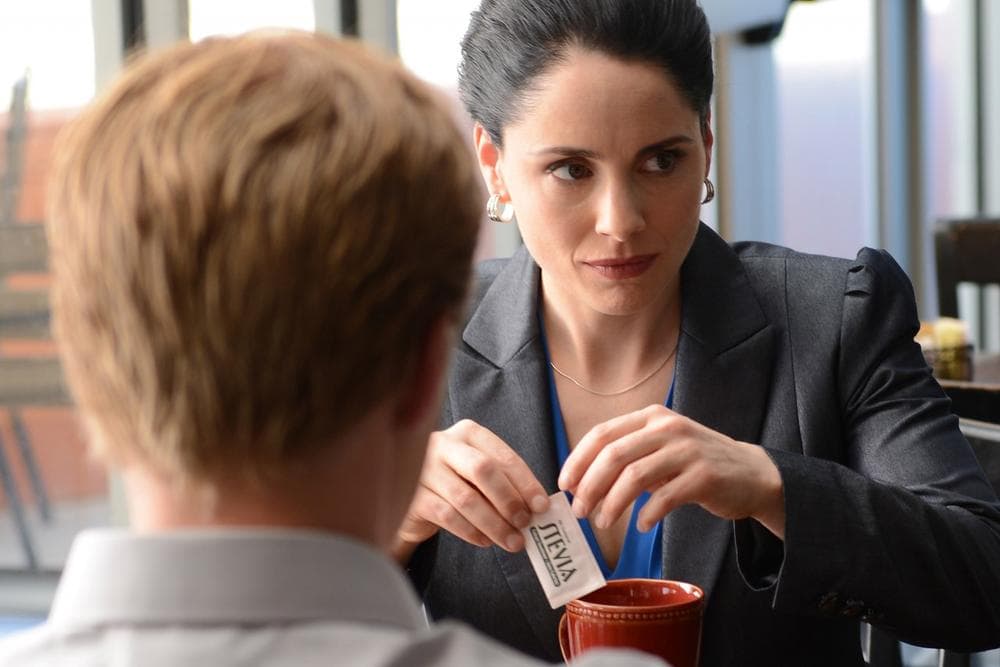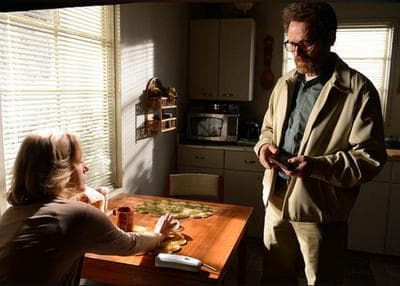Advertisement
'Breaking Bad' Series Finale: The Tidy End Worked — But At Some Cost
[Warning: This analysis contains spoilers.]
One of the greatest shows ever to grace TV, “Breaking Bad” ended well in a mechanically seamless, loose end-averse finale that felt right even if it was not quite the emotional powerhouse we deserved.

Series-ending episode “Felina,” an anagram for finale, moved chess pieces around and then cleared them in efficient ways. Walter White died hoisted by his own scientific mind, but not before razing the neo-Nazis with his machine gun apparatus, and sparing Jesse Pinkman, Walt’s body stacked on Jesse’s not quite low enough to avoid the swath of bullets. The mortally wounded Walt died submerged in his own vanity, admiring his own image reflected in the meth equipment, shadowed by encroaching police lights and death. Anxious but slippery Lydia was a ricin victim by way of Stevia. Polite sociopath Todd was strangled by Jesse. Gretchen and Elliot Schwartz, fresh off their Charlie Rose appearance, did not die, but Walt’s trickery forced them to play a role in embezzling money beyond his grave.
In a series rich with surprises and feints, the end was straightforward, and surprising only in its mercy. Jesse, long viewers’ favorite moral barometer, let escape an agonizing yell and smiled, which unburdened the show’s last stand-in for flawed goodness from the same fate we suffered through with Hank Schrader. In a moment that creator Vince Gilligan likened to the end of the classic western “The Searchers,” Walt, when faced with the child-like captives he vowed to kill, rescued him instead. In a six-year run stacked with sadism and despair, the gesture carried hopeful tidings. For Jesse, and perhaps for Brock, the boy he wanted to have a future unlike his own.
In a series rich with surprises and feints, the end was straightforward, and surprising only in its mercy.
“Breaking Bad” was never perfect, but it always came so close the never was moot. Skinny Pete and Badger wore out viewer patience; Skyler’s subplot with Ted seemed like filler; Andrea never emerged as a living, breathing love interest for Jesse, and her indirect involvement with Gus Fring cried of tidy coincidence; Skyler’s odyssey from morally reprimanding wife to willing participant to Lady Macbeth and back again felt hastened by plot movement rather than carefully written character epiphany; Jesse’s misery, and the depths to which the story subjected him, had limits, but Gilligan and his writing team didn’t acknowledge any and betrayed Aaron Paul by not layering the pain with occasional ribbons of light; the neo-Nazis were caricatures, pointing to a brief failure of imagination from the inventive writers; the POV shots and time-lapse photography worked as often as they self-consciously reached for style points already amply accrued.

But enough with the bad. No show on TV was tighter, each thread of story weaving and spiraling into the next, with so few digressions that we marveled at its single-mindedness. In an era of jump-the-shark season-prolongers, “Breaking Bad” made time count with wrecking-ball intensity. And while the storyline stayed fearlessly on point, the visual buzz of Albuquerque’s grand vistas opened up the action, evoking classic Western cinema, landscapes on which good and evil played out to grayer degrees than before. None of the other great contemporary television series, “The Wire” and “The Sopranos” among them, can quite claim such powerful exteriors to match the insular drama.
Perhaps the most startling accomplishment of “Breaking Bad” has been the wrestling match between the audience and Walter White, and the Jekyll-and-Hyde dynamics of Walt and his inner Heisenberg. Some of us marked Walt’s sins as means to an end — I did it all for my family was the popular refrain — but in the finale, the narcissist tore away at pretense and offered this: “I did it for me.” That self-awareness, teamed with the return of his cancer, lightened his irredeemable load: letting Jane die, poisoning Brock, murdering Mike, and maliciously confessing his role in Jane’s death to Jesse. Maybe as testament to our perception of Walt’s egotism, we assumed he meant to kill the Schwartzes or at least set the record straight. No, he used them as he used others, but without avenging their public comments. Was this his usual manipulation, or a sign of his recognition that not all wrongs can be righted?

“Breaking Bad” made us sweat with Walt, sweat for Hank taking Walt down, and yet never completely broke ranks by urging us to pass moral judgment, tempting as the concept of Heisenberg's subsuming Walt seemed. Here Bryan Cranston showed his devastating range, modulating his voice to a middle ground between the hate-filled Heisenberg and the milquetoast Walt, giving us a character finally at peace with the tension of polar emotions working in unison. As it turned out, Heisenberg didn't need a shaved head and a hat, nor did Walt need hair and a family; they just needed Cranston, all grit and energy, and it was a declarative definition of performance craft.
As finales go for antiheroes, this one worked, but at some cost. “The Sopranos” faded to inconclusiveness, “The Shield” went darker but not all the way, and “Dexter” dashed fans’ hopes with stormy metaphors and lousy writing. “Breaking Bad” ended the way it needed to, but now that we have seen the end, the flash-forward upon which the two parts of the fifth season pivoted, forced the show into a tight corner. Not too tight to escape, but tight enough that some of the emotional beats between Jesse and Walt, always the most scrutable heart of “Breaking Bad,” lost some oomph. When a piqued Uncle Jack made his goons bring in Jesse for questionable reasons, the gears of neat contrivance distracted from an emotionally tense climax.
Advertisement
'Breaking Bad' was never perfect, but it always came so close the never was moot.
Gilligan, in his scramble to synch up sizable moving parts (machine gun, ricin) with the present day, hurtled toward an end that dutifully satisfied plot. Always a program rife with cleverness and tricks, season five moved into a more sophisticated tier of storytelling, as dread-ratcheting turned to inevitability and tragic foreshadowing, marks of an advancement in technique. Yet in the finale, as rich and memorable as it was, the smooth technique undercut the messy humanity, the reason we always cared. But what a character, what a story.
Related:
- Ed Siegel for The ARTery: Gilligan’s Guile And ‘Breaking Bad’ — We’re Done, He Says We’re Done
- Steve Almond for Cog: American Psycho: Why We Root For Walter White
- Linda Holmes for NPR: 'Breaking Bad' Lands Its Finale A Little Too Cleanly

This program aired on October 1, 2013. The audio for this program is not available.